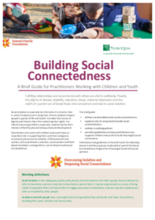Social isolation is especially harmful when it is chronic; that is, when it endures over a long time. Chronic isolation impairs people’s quality of life and health. It erodes their sense of dignity and thwarts them from attaining their rights. For infants and young children, especially, isolation harms their chances of healthy physical and psychosocial development.
Practitioners who work with children and youth have an important role in supporting them, and their caregivers, to prevent and overcome isolation. Child and youth care workers, ECD practitioners, teachers, social workers and faith-based volunteers, among others, can all help to build social connectedness.
This brief guide:
• defines social isolation and social connectedness;
• explains why it is important to build social connectedness;
• outlines enabling policies;
• provides guidelines on how practitioners can support children and youth to build meaningful social connections.
Information and guidelines in the brief come from desktop research and focus groups conducted as part of the Social Connectedness Programme of Synergos South Africa and partners.

